人教高中英语必修一unit4Earthquake课文翻译
- 格式:ppt
- 大小:1.85 MB
- 文档页数:7
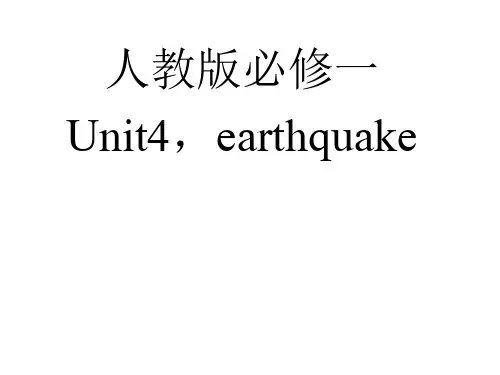
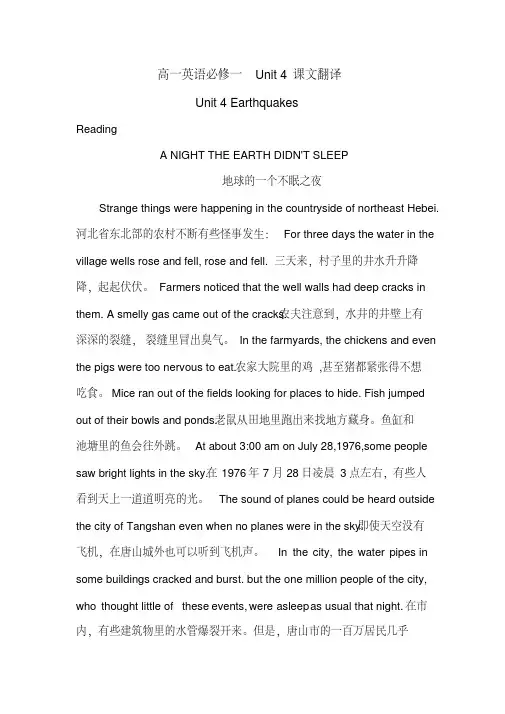
高一英语必修一Unit 4课文翻译Unit 4 EarthquakesReadingA NIGHT THE EARTH DIDN'T SLEEP地球的一个不眠之夜Strange things were happening in the countryside of northeast Hebei.河北省东北部的农村不断有些怪事发生:For three days the water in the village wells rose and fell, rose and fell.三天来,村子里的井水升升降降,起起伏伏。
Farmers noticed that the well walls had deep cracks in them. A smelly gas came out of the cracks.农夫注意到,水井的井壁上有深深的裂缝,裂缝里冒出臭气。
In the farmyards, the chickens and even the pigs were too nervous to eat.农家大院里的鸡,甚至猪都紧张得不想吃食。
Mice ran out of the fields looking for places to hide. Fish jumped out of their bowls and ponds.老鼠从田地里跑出来找地方藏身。
鱼缸和池塘里的鱼会往外跳。
At about 3:00 am on July 28,1976,some people saw bright lights in the sky.在1976年7月28日凌晨3点左右,有些人看到天上一道道明亮的光。
The sound of planes could be heard outside the city of Tangshan even when no planes were in the sky.即使天空没有飞机,在唐山城外也可以听到飞机声。
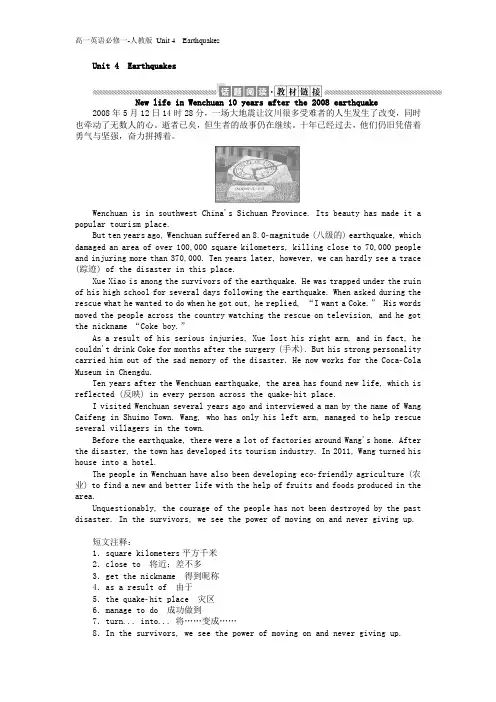
Unit 4EarthquakesNew life in Wenchuan 10 years after the 2008 earthquake 2008年5月12日14时28分,一场大地震让汶川很多受难者的人生发生了改变,同时也牵动了无数人的心。
逝者已矣,但生者的故事仍在继续。
十年已经过去,他们仍旧凭借着勇气与坚强,奋力拼搏着。
Wenchuan is in southwest China's Sichuan Province. Its beauty has made it a popular tourism place.But ten years ago, Wenchuan suffered an 8.0magnitude (八级的) earthquake, which damaged an area of over 100,000 square kilometers, killing close to 70,000 people and injuring more than 370,000. Ten years later, however, we can hardly see a trace (踪迹) of the disaster in this place.Xue Xiao is among the survivors of the earthquake. He was trapped under the ruin of his high school for several days following the earthquake. When asked during the rescue what he wanted to do when he got out, he replied, “I want a Coke.” His words moved the people across the country watching the rescue on television, and he got the nickname “Coke boy.”As a result of his serious injuries, Xue lost his right arm, and in fact, he couldn't drink Coke for months after the surgery (手术). But his strong personality carried him out of the sad memory of the disaster. He now works for the CocaCola Museum in Chengdu.Ten years after the Wenchuan earthquake, the area has found new life, which is reflected (反映) in every person across the quakehit place.I visited Wenchuan several years ago and interviewed a man by the name of Wang Caifeng in Shuimo Town. Wang, who has only his left arm, managed to help rescue several villagers in the town.Before the earthquake, there were a lot of factories around Wang's home. After the disaster, the town has developed its tourism industry. In 2011, Wang turned his house into a hotel.The people in Wenchuan have also been developing ecofriendly agriculture (农业) to find a new and better life with the help of fruits and foods produced in the area.Unquestionably, the courage of the people has not been destroyed by the past disaster. In the survivors, we see the power of moving on and never giving up.短文注释:1.square kilometers平方千米2.close to 将近;差不多3.get the nickname 得到昵称4.as a result of 由于5.the quakehit place 灾区6.manage to do 成功做到7.turn... into... 将……变成……8.In the survivors, we see the power of moving on and never giving up.在幸存者身上,我看到一种力量——继续下去,永不放弃。
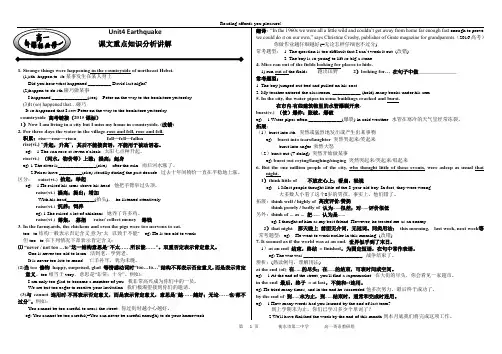
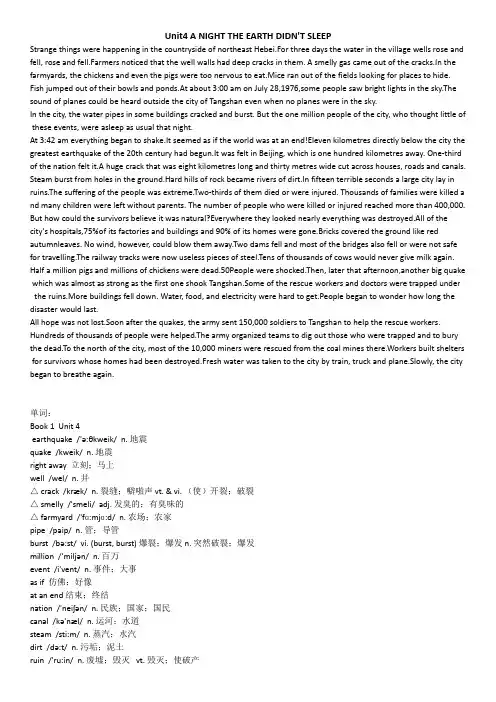
Unit4A NIGHT THE EARTH DIDN'T SLEEPStrange things were happening in the countryside of northeast Hebei.For three days the water in the village wells rose and fell,rose and fell.Farmers noticed that the well walls had deep cracks in them.A smelly gas came out of the cracks.In the farmyards,the chickens and even the pigs were too nervous to eat.Mice ran out of the fields looking for places to hide. Fish jumped out of their bowls and ponds.At about3:00am on July28,1976,some people saw bright lights in the sky.The sound of planes could be heard outside the city of Tangshan even when no planes were in the sky.In the city,the water pipes in some buildings cracked and burst.But the one million people of the city,who thought little of these events,were asleep as usual that night.At3:42am everything began to shake.It seemed as if the world was at an end!Eleven kilometres directly below the city the greatest earthquake of the20th century had begun.It was felt in Beijing,which is one hundred kilometres away.One-third of the nation felt it.A huge crack that was eight kilometres long and thirty metres wide cut across houses,roads and canals. Steam burst from holes in the ground.Hard hills of rock became rivers of dirt.In fifteen terrible seconds a large city lay in ruins.The suffering of the people was extreme.Two-thirds of them died or were injured.Thousands of families were killed a nd many children were left without parents.The number of people who were killed or injured reached more than400,000. But how could the survivors believe it was natural?Everywhere they looked nearly everything was destroyed.All of thecity's hospitals,75%of its factories and buildings and90%of its homes were gone.Bricks covered the ground like red autumnleaves.No wind,however,could blow them away.Two dams fell and most of the bridges also fell or were not safe for travelling.The railway tracks were now useless pieces of steel.Tens of thousands of cows would never give milk again. Half a million pigs and millions of chickens were dead.50People were shocked.Then,later that afternoon,another big quake which was almost as strong as the first one shook Tangshan.Some of the rescue workers and doctors were trapped under the ruins.More buildings fell down.Water,food,and electricity were hard to get.People began to wonder how long the disaster would last.All hope was not lost.Soon after the quakes,the army sent150,000soldiers to Tangshan to help the rescue workers. Hundreds of thousands of people were helped.The army organized teams to dig out those who were trapped and to bury the dead.To the north of the city,most of the10,000miners were rescued from the coal mines there.Workers built shelters for survivors whose homes had been destroyed.Fresh water was taken to the city by train,truck and plane.Slowly,the city began to breathe again.单词:Book1Unit4earthquake/'ə:θkweik/n.地震quake/kweik/n.地震right away立刻;马上well/wel/n.井△crack/kræk/n.裂缝;噼啪声vt.&vi.(使)开裂;破裂△smelly/'smeli/adj.发臭的;有臭味的△farmyard/'fɑ:mjɑ:d/n.农场;农家pipe/paip/n.管;导管burst/bə:st/vi.(burst,burst)爆裂;爆发n.突然破裂;爆发million/'miljən/n.百万event/i'vent/n.事件;大事as if仿佛;好像at an end结束;终结nation/'neiʃən/n.民族;国家;国民canal/kə'næl/n.运河;水道steam/sti:m/n.蒸汽;水汽dirt/də:t/n.污垢;泥土ruin/'ru:in/n.废墟;毁灭vt.毁灭;使破产in ruins严重受损;破败不堪suffering/'sʌfəriŋ/n.苦难;痛苦extreme/ik'stri:m/adj.极度的injure/'indʒə/vt.损害;伤害△survivor/sə'vaivə/n.幸存者;生还者;残存物destroy/di'strɔi/vt.破坏;毁坏;消灭brick/brik/n.砖;砖块dam/dæm/n.水坝;堰堤track/træk/n.轨道;足迹;痕迹useless/'ju:slis/adj.无用的;无效的;无益的shock/ʃɔk/vt.&vi.(使)震惊;震动n.休克;打击;震惊rescue/'reskju:/n.&vt.援救;营救trap/træp/vt.使陷入困境n.陷阱;困境electricity/ilek'trisəti/n.电;电流;电学disaster/di'zɑ:stə/n.灾难;灾祸dig out掘出;发现bury/'beri/vt.埋葬;掩埋;隐藏mine/main/n.矿;矿山;矿井miner/main/n.矿工shelter/'ʃeltə/n.掩蔽;掩蔽处;避身处a(great)number of许多;大量的title/'taitl/n.标题;头衔;资格reporter/ri'pɔ:tə/n.记者bar/bɑ:/n.条;棒;条状物damage/'dæmidʒ/n.&vt.损失;损害frighten/'fraitən/vt.使惊吓;吓唬frightened/'fraitnd/adj.受惊的;受恐吓的frightening/'fraitəniŋ/adj.令人恐惧的congratulation/kənɡrætʃu'leiʃən/n.祝贺;(复数)贺词judge/dʒʌdʒ/n.裁判员;法官vt.断定;判断;判决sincerely/sin'siəli/adv.真诚地;真挚地express/ik'spres/vt.表示;表达n.快车;速递outline/'autlain/n.要点;大纲;轮廓headline/'hedlain/n.报刊的大字标题cyclist/'saiklist/n.骑自行车的人。
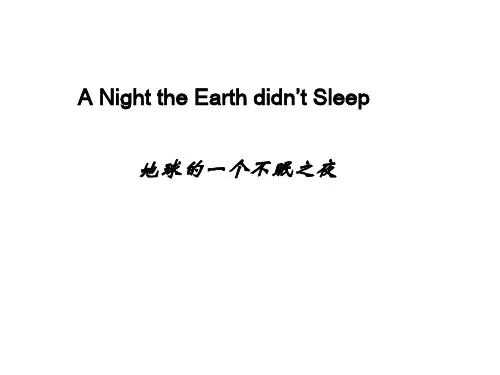
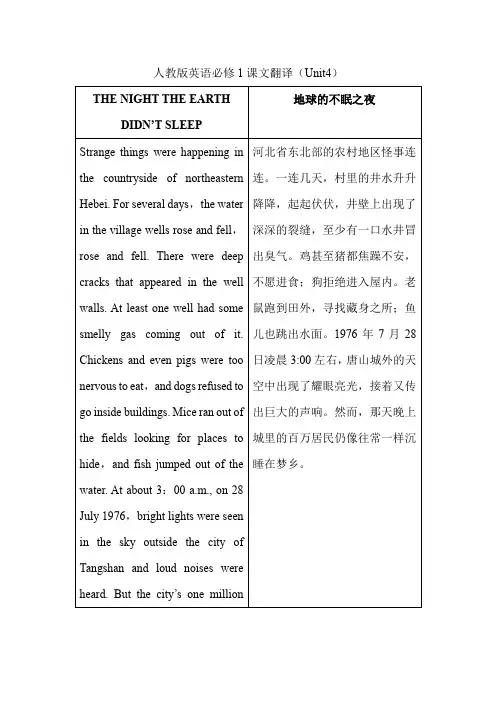
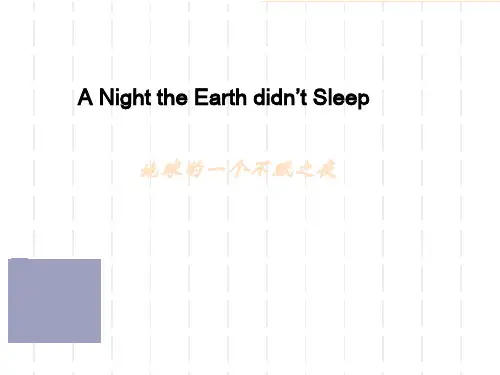
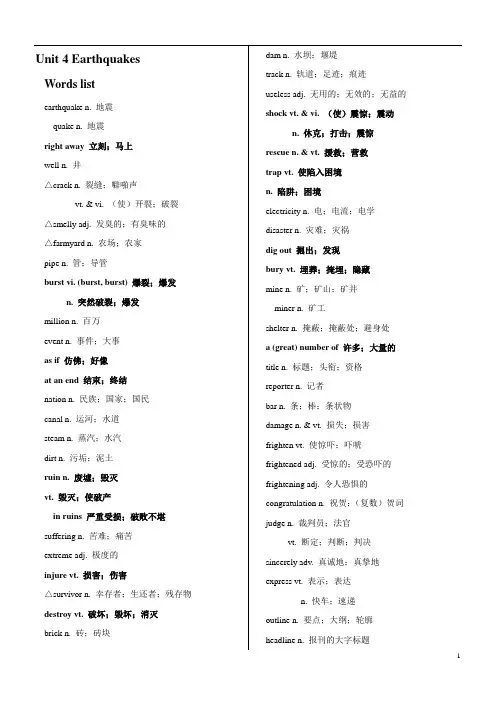
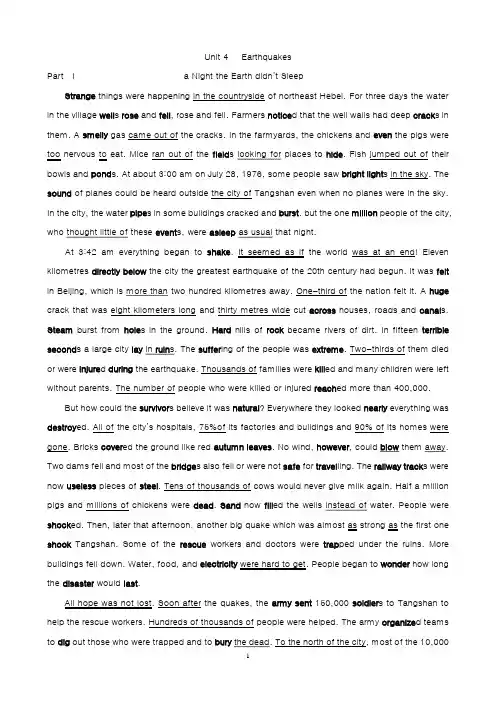
Unit 4 EarthquakesPart I a Night the Earth didn’t SleepStrange things were happening in the countryside of northeast Hebei.For three days the water in the village well s rose and fell, rose and fell. Farmers notice d that the well walls had deep crack s in them. A smelly gas came out of the cracks. In the farmyards, the chickens and even the pigs were too nervous to eat. Mice ran out of the field s looking for places to hide. Fish jumped out of their bowls and pond s. At about 3:00 am on July 28, 1976, some people saw bright light s in the sky. The sound of planes could be heard outside the city of Tangshan even when no planes were in the sky. In the city, the water pipe s in some buildings cracked and burst. but the one million people of the city, who thought little of these event s, were asleep as usual that night.At 3:42 am everything began to shake It seemed as if the world was at an end! Eleven kilometres directly below the city the greatest earthquake of the 20th century had begun. It was felt in Beijing, which is more than two hundred kilometres away. One-third of the nation felt it. A huge crack that was eight kilometers long and thirty metres wide cut across houses, roads and canal s. Steam burst from hole s in the ground. Hard hills of rock became rivers of dirt. In fifteen terrible second s a large city lay in ruin s. The suffer ing of the people was extreme. Two-thirds of them died or were injure d during the earthquake. Thousands of families were kill ed and many children were left without parents. The number of people who were killed or injured reach ed more than 400,000.But how could the survivor s believe it was natural? Everywhere they looked nearly everything was destroy ed. All of the city’s hospitals, 75%of its factories and buildings and 90% of its homes were gone. Bricks cover ed the ground like red autumn leaves. No wind, however, could blow them away. Two dams fell and most of the bridge s also fell or were not safe for travel ling. The railway track s were now useless pieces of steel. Tens of thousands of cows would never give milk again. Half a million pigs and millions of chickens were dead. Sand now fill ed the wells instead of water. People were shock ed. Then, later that afternoon, another big quake which was almost as strong as the first one shook Tangshan. Some of the rescue workers and doctors were trap ped under the ruins. More buildings fell down. Water, food, and electricity were hard to get. People began to wonder how long the disaster would last.All hope was not lost. Soon after the quakes, the army sent 150,000 soldier s to Tangshan to help the rescue workers. Hundreds of thousands of people were helped. The army organize d teams to dig out those who were trapped and to bury the dead. To the north of the city, most of the 10,000miner s were rescued from the coal mine s there. Workers built shelter s for survivor s whose homes had been destroyed. Fresh water was taken to the city by train, truck and plane. Slowly, the city began to breathe again.Part 2. Using languageDear____,Congratulations! are pleased to tell you that you have won the high school speaking competition about new Tangshan. Your speech was heard by a group of five judge s, all of whom agree d that it was the best one this year. Your parents and your school should be very proud of you!Next month the city will open a new park to honour those who died in the terrible disaster. The park will also honour those who helped the survivors. Our office would like to have you speak to the park visitors on July 28 at 11:00 am. As you know, this is the day the quake happened thirty-____years ago.We invite you to bring your family and friends on that special day.Sincerely,Zhang Sha。
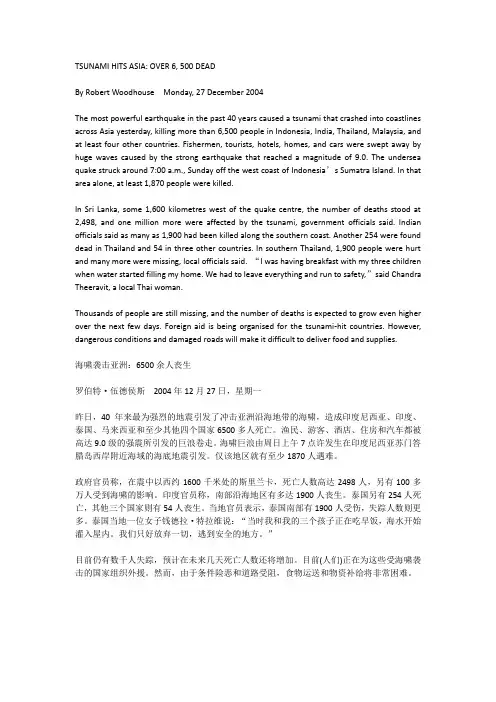
TSUNAMI HITS ASIA: OVER 6, 500 DEADBy Robert Woodhouse Monday, 27 December 2004The most powerful earthquake in the past 40 years caused a tsunami that crashed into coastlines across Asia yesterday, killing more than 6,500 people in Indonesia, India, Thailand, Malaysia, and at least four other countries. Fishermen, tourists, hotels, homes, and cars were swept away by huge waves caused by the strong earthquake that reached a magnitude of 9.0. The undersea quake struck around 7:00 a.m., Sunday off the west coast of Indonesia’s Sumatra Island. In that area alone, at least 1,870 people were killed.In Sri Lanka, some 1,600 kilometres west of the quake centre, the number of deaths stood at 2,498, and one million more were affected by the tsunami, government officials said. Indian officials said as many as 1,900 had been killed along the southern coast. Another 254 were found dead in Thailand and 54 in three other countries. In southern Thailand, 1,900 people were hurt and many more were missing, local officials said. “I was having breakfast with my three children when water started filling my home. We had to leave everything and run to safety,”said Chandra Theeravit, a local Thai woman.Thousands of people are still missing, and the number of deaths is expected to grow even higher over the next few days. Foreign aid is being organised for the tsunami-hit countries. However, dangerous conditions and damaged roads will make it difficult to deliver food and supplies.海啸袭击亚洲:6500余人丧生罗伯特·伍德侯斯2004年12月27日,星期一昨日,40年来最为强烈的地震引发了冲击亚洲沿海地带的海啸,造成印度尼西亚、印度、泰国、马来西亚和至少其他四个国家6500多人死亡。
Unit 4disaster / dɪˈzɑ:stə(r) /n.灾难;灾害tornado /tɔ:ˈneɪdəʊ / n.(pl. -oes or -os) 龙卷风;旋风drought / draʊt / n.旱灾;久旱landslide / ˈlændslaɪd / n. ( landfall) (山地或悬崖的)崩塌;滑坡slide / slaɪd / vi. & vt. (使)滑行;滑动tsunami / tsu:ˈnɑ:mi /n.海啸flood /flʌd / n.洪水;大量vi.淹没;大量涌入vt.使灌满水;淹没volcanic eruption / vɔlˈkænɪk ɪˈrʌpʃn / 火山喷发magnitude /ˈmægnɪtju:d / n. (地)震级;重大rescue /ˈreskju:/n.& vt.营救;救援damage /ˈdæmɪdʒ / vt.损害;破坏 n.损坏;损失destroy /dɪ'strɔɪ/ vt.摧毁;毁灭evacuate /ɪˈvækjueɪt / vt.疏散;撤出 vi.撤离helicopter /ˈhelɪkɒptə(r)/ n.直升机death/ deθ/n. 死;死亡affect /ə'fekt/ vt.影响;(疾病)侵袭;深深打动shelter /'ʃeltə(r)/ n.避难处;居所;庇护vt.保护;掩蔽vi.躲避 (风、雨或危险)crack /kræk/ n.裂纹;裂缝vi. & vt. (使)破裂as if 似乎;好像;仿佛ruin /'ru:ɪn/ n.&vt. 破坏;毁坏in ruins 严重受损;破败不堪percent / pəˈsent / n.百分之……adj.&adv.每一百种brick /brɪk/ n.砖;砖块metal /'metl/ n.金属shock /ʃɒk/ n.震惊;令人震惊的事;休克vt.(使)震惊in shock 震惊;吃惊electricity /ɪˌlekˈtrɪsəti/ n.电;电能trap /træp/ vt.使落入险境;使陷入圈套n.险境;陷阱bury /ˈberi/vt.埋葬;安葬breathe / bri:ð/ vi.& vt.呼吸revive /rɪˈvaɪv/ vt.& vi.复活;(使)苏醒revival /rɪˈvaɪvl/ n.振兴;复苏effort /'efət/ n.努力;艰难的尝试;尽力unify /ˈju:nɪfaɪ / vi.& vt.统一;(使)成一体wisdom /ˈwɪzdəm/ n.智慧;才智context /ˈkɒntekst/ n.上下文;语境;背景suffer /ˈsʌfə/ vt.遭受;蒙受vi. (因疾病、痛苦、悲伤等)受苦volcano /vɒlˈkeɪnəʊ/ n. (pl. -oes or -os)火山erupt /ɪˈrʌpt/ vi.& vt. (火山)爆发;(岩浆、烟等)喷出supply /səˈplaɪ/ n.供应(量);补给;[pl.] 补给品vt.供应;供给typhoon /taɪˈfu:n/ n.台风in the open air 露天;在户外hurricane /ˈhʌrɪkən/ n . (尤指大西洋的)飓风survive /səˈvaɪv/ vi.生存;存活 vt. 幸存;艰难度过power /ˈpaʊə(r)/ n.电力供应;力量;控制力tap /tæp/ vi.& vt.轻叩;轻敲;轻拍n.水龙头;轻叩;轻敲pipe /paɪp/ n.管子;管道whistle /ˈwɪsl/ vi.吹口哨;发出笛声vt.吹口哨n.哨子(声);呼啸声emergency /iˈmɜ:dʒənsi/ n.突发事件;紧急情况calm /kɑ:m/adj.镇静的;沉着的 vt.使平静;使镇静aid /eɪd/ n.援助;帮助;救援物资 vi.& vt. (formal) 帮助;援助kit /kɪt/ n.成套工具;成套设备first aid kit 急救箱on hand现有(尤指帮助)crash /kræʃ/ vt.& vi.碰撞;撞击 n.撞车;碰撞sweep /swi:p/ vt. & vi. ( swept, swept) 打扫;清扫sweep away消灭;彻底消除wave /weɪv/ n.海浪;波浪vi.& vt.挥手;招手strike /straɪk/ vi.& vt. (struck, struck/stricken) 侵袭;突击;击打n. 罢工;罢课;袭击deliver /dɪˈlɪvə(r)/ vt. & vi.递送;传达vt.发表summary /ˈsʌməri/ n.总结;概括;概要effect /ɪˈfekt/ n.影响;结果;效果length /leŋθ/n.长;长度THE NIGHT THE EARTH DIDN’T SLEEP地球的一个不眠之夜Strange things were happening in the countryside of northeastern Hebei. For several days,the water in the village wells rose and fell,rose and fell. There were deep cracks that appeared in the well walls. At least one well had some smelly gas coming out of it. Chickens and even pigs were too nervous to eat,and dogs refused to go inside buildings. Mice ran out of the fields looking for places to hide,and fish jumped out of the water. At about 3:00 a.m., on 28 July 1976,bright lights were seen in the sky outside the city of Tangshan and loud noises were heard. But the city’s one million people were asleep as usual that night.河北省东北部的农村地区怪事连连:一连几天,村子里的井水升升降降,起起伏伏,井壁上出现了深深的裂缝。
高一英语必修一Unit 4课文翻译Unit 4 EarthquakesReadingA NIGHT THE EARTH DIDN'T SLEEP地球的一个不眠之夜Strange things were happening in the countryside of northeast Hebei.河北省东北部的农村不断有些怪事发生:For three days the water in the village wells rose and fell, rose and fell.三天来,村子里的井水升升降降,起起伏伏。
Farmers noticed that the well walls had deep cracks in them. A smelly gas came out of the cracks.农夫注意到,水井的井壁上有深深的裂缝,裂缝里冒出臭气。
In the farmyards, the chickens and even the pigs were too nervous to eat.农家大院里的鸡,甚至猪都紧张得不想吃食。
Mice ran out of the fields looking for places to hide. Fish jumped out of their bowls and ponds.老鼠从田地里跑出来找地方藏身。
鱼缸和池塘里的鱼会往外跳。
At about 3:00 am on July 28,1976,some people saw bright lights in the sky.在1976年7月28日凌晨3点左右,有些人看到天上一道道明亮的光。
The sound of planes could be heard outside the city of Tangshan even when no planes were in the sky.即使天空没有飞机,在唐山城外也可以听到飞机声。
必修一 Unit 4 Earthquakes地震II Reading A NIGHT THE EARTH DIDN’T SLEEP地球不眠之夜Strange things were happening in the countryside of northeast Hebei.在河北东北农村发生奇怪的事情。
For three days the water in the village wells rose and fell, rose and fell. 有三天时间村里的井水一会儿上升一会儿下降。
Farmers noticed that the well walls had deep cracks in them.农民们注意到井壁上出现了深深的裂缝。
A smelly gas came out of the cracks.裂缝中散发出难闻的气味。
【注释:smelly发出难闻气味的;有臭味的】In the farmyards, the chickens and even the pigs were too nervous to eat.在农家宅院小鸡,甚至连猪都紧张的不吃食。
【注释:① too … to …:太…而不能…②注意:在be + too + adj. + to结构中该结构中的形容词主要是表示心情,如:ready, glad, surprised, happy, eager, willing 或表示描述性的,如good, kind, true等,则too表示“很, 非常”之意。
eg.We are all too pleased to listen to the opinions of other.我们非常乐意听别人的意见。
③ cannot too不至于过度, 越…越好 eg. You cannot be too careful to cross the street.你过马路的时候越小心越好。